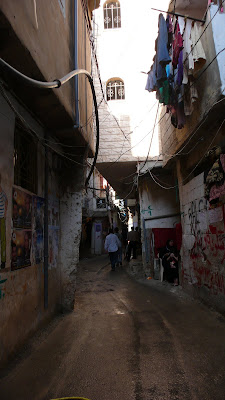
Being a last minute person is organizing a trip to Lebanon the night before boarding a flight to Beirut. But I wasn't the person who organized this trip. I had to fly out to Spain from Jordan so the last minute planning of the Lebanon trip meant it was going to be a short stay and I was determined to make the most out of it.
Our flight was shorter than the drive to the airport and upon arrival, we are greeted by a Lebanese woman who defines the sentence "your typical idea of..." She comes bearing 8 inch stilettos (it's 11am), a pearl tie (yes, pearl), long, straight, jet black hair, and, wait for it...a diamond in her tooth. Mish Mish, our driver, is a young woman from Jounieh who greeted us with "hi, keefkom, ca va?" but spoke no French, and no English. I'm in love with the city and I just arrived!


On the road, billboards and posters commemorating Ayatollah Fadlallah lined the streets. Mish Mish drives us to our hotel, which, unknown to us, is in the Rawsheh area (right on the beach). We were ecstatic, until the receptionist tells us that it's actually the one in Al-Hamra (downtown, and equally as fantastic). Our driver becomes enraged and begins to curse and yell in the car. She hates driving in Al-Hamra's traffic. As we drive, I spot a friend I met in Cairo who lives in the US walking down the streets. She squeezes into the car with us and states the obvious: our driver is lost, and has been for over an hour. We finally get to the hotel and get rid of our ill mouthed driver, who expects us to use her services again.

Al-Hamra is bursting with energy, and Beirut's streets are filled with scars of the war and renovated Ottoman buildings. The food is fantastic, the people are lively, and the place is flooded with contradictions. I could walk on the beautiful streets and the corniche for hours, hours I unfortunately, did not have.
For years I've been looking forward to pay Beirut a visit, and I vowed I would not leave before I visited the Shatila camp. My friend provided us with a contact who was able to take us in the camp. I've had the opportunity to visit a number of refugee camps, but Shatila was one of the saddest ones I've been too. The electrical wires dangerously hang from the homes and destroyed buildings (such as the old PLO offices) are a constant reminder of the war.
Shatila camp
The mass graves of the victims of the 1982 Sabra and Shatila massacre (only photo I could get)
At night, we head to rue Solidaire and watch Spain beat Germany to clinch a spot in the World Cup finals and realize, we'll be in Spain for that game.
The next day we jump into a cab with a driver we met the night before. He offered to accommodate our brief schedule and take us to Jeita, Jbeil (Byblos) and Harissa for $150USD, after bargaining. Our first stop is the Jeita grotto, the magnificent crystallized limestone caves. Photography was prohibited because it supposedly damages the caves, although the entire park is sponsored by Kodak. Ironic? The Arab world is filled with irony. And contradictions. If you're ever in Lebanon, Jeita is a must-see.
View from the top of Harissa
The second stop was Harissa, home to the enormous status of the virgin Mary on the very top of the mountain. The cold breeze was a nice change to the humidity that filled the Beirut air. It's crazy how much Harissa resembles Haifa, and the journey to the top of the mountain via téléphérique only brought back memories of climbing Haifa's many stairs during shabbatt.
Byblos
Our third and final stop was in Byblos, a city I've wanted to visit for a long time. I felt like I was teleported back to the old city of Akka as the two looked very much alike. After eating fish and buying a few old postcards (exactly as I did in Akka), we returned to Beirut.
Byblos
I am an energetic person, be it on vacation or during regular days of life. I attempt to cover as much as possible in the short periods of time I have. My brief stay in Lebanon could not be fulfilled without a stop to the ocean where we found ourselves the only women sans boob jobs or nose jobs. I almost wanted to buy those Vicks strips to put on top of my nose and pretend I had one (kidding!). After gaining a few more freckles, I squeezed in a visit to one of Beirut's many bookshops where I had to remember that I was only allocated 23kg.


































































